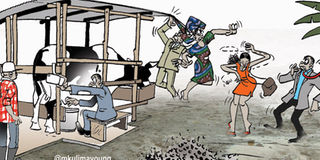My nine farming lessons for city dwellers

It was quite a spectacle having these characters on the Mkulima Mixed Farm. None had the right dress code. Dr Mike was dressed in a designer suit. Tesh was in a kitenge with a tremendous eye-catching headgear. Wandia, as usual, was in her short skirt that always leaves a lot for imagination. ILLUSTRATION | IGAH
What you need to know:
- They wanted professional advice on how one can start a commercial farm.
- Wandia was more interested in getting some passion fruits hanging near her artificial hair.
- For a commercial farm, avoid employing relatives or friends. Their productivity is normally poor because you are unable to discipline them and demand for results.
- I was left wondering if they took my advice seriously and whether they will offer me some business as they farm through the telephone.
After giving an outstanding speech during the Mashambani Prize Giving Day, I acquired a celebrity status.
Even those who had looked down upon farmers, including the principal, felt ashamed that they mobbed me with congratulatory messages.
My speech focused on farming as a rewarding enterprise for the youth.
Dr Mike, Wandia, Tesh, and Ndege were among those city dwellers who were so impressed with me. Others included the MCAs and county officials. The four decided to pay me a visit.
Wandia is the girl who makes my heart skip when I come face-to-face with her. She has never been to my farm because she prefers socialising more on Facebook and WhatsApp group.
Dr Mike schooled with my elder brother. He left the village courtesy of his academic exploits after being invited to join a national school and later university. He says after travelling many times to Europe for conferences, he has forgotten many paths in the village.
Ndege says he has some special attachment to Mashambani village despite currently living abroad.
UNDERUTILISED LAND
Tesh is the daughter of one of the wealthiest men in Mashambani. Her father owns a large chunk of underutilised land and all his children seem not interested in agriculture except Tesh.
It was quite a spectacle having these characters on the Mkulima Mixed Farm. Being an impromptu visit, none had the right dress code. Dr Mike was dressed in a designer suit. Tesh was in a kitenge with a tremendous eye-catching headgear.
Wandia, as usual, was in her short skirt that always leaves a lot for imagination. She attracted honey bees like flowers.
“For this kind of brief training, I normally charge Sh500 but today I will do it for free,” I opened the discussion.
“Thank you Mkulima,” Ndege and Tesh said in unison. They later wanted professional advice on how one can start a commercial farm.
“Starting a farm is not a simple errand. You need to know where, how, what you want to farm and how big you want to do it,” I continued as they started making notes seated near my cowshed where Wekesa was milking the cows in the hope they would carry some milk.
“Before anything else have a solid plan for operational and strategic reasons,” I said as Tesh gestured her head in confirmation while Wandia was more interested in getting some passion fruits hanging near her artificial hair.
“Like in any other enterprise, it’s important to have business goals, objectives, financial and market goals,” I said.
AVOID EMPLOYING RELATIVES
“But that should not stress you since Mkulima can assist, obviously at a cost,” I added now trying to get some business for myself.
“For a commercial farm, avoid employing relatives or friends. Their productivity is normally poor because you are unable to discipline them and demand for results,” I warned.
I emphasised that they needed to respect the input of professionals such as extension officers or veterinarians. “Sometimes farmers think the fees they give these officers is too much, but they save you a lot,” I said and Dr Mike nodded.
I told them to always seek advice on the seeds or breeds they want to farm to enable them get better yields.
“Avoid following trends or exciting stories of how one is making millions. In conclusion, make a budget, have a look at your financial situation since farming is an investment.”
“Remember farming doesn’t pay you monthly salary, your pay day comes when you sell your produce often at the end of the season. Start small and simple and remember Murphy’s Law: anything bad that can happen, and it will,” I said as they rushed to their cars when it suddenly started raining, saving me the losses I would have incurred by offering them milk.
Soon, they drove off in a huff to avoid the muddy Mashambani roads.
I was left wondering if they took my advice seriously and whether they will offer me some business as they farm through the telephone.





